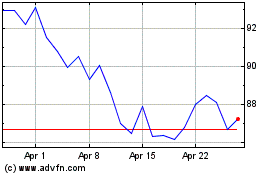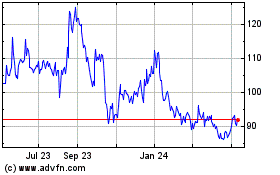By Sabrina Siddiqui and Saeed Shah
President Biden's administration plans to donate 500 million
coronavirus vaccine doses produced by Pfizer Inc. to the rest of
the world, according to people familiar with the plans.
Pfizer and German partner BioNTech SE confirmed their part of
the deal early Thursday, saying 200 million doses would go to other
countries this year and 300 million in the first half of next year.
The government has the option for additional doses in 2022, the
companies said.
White House Covid-19 coordinator Jeff Zients and his team
negotiated the deal to buy the doses from Pfizer over the past four
weeks, one of the people said. All of those doses will be donated
through Covax, the global initiative to help vaccinate developing
countries, and they will go to 92 lower-income countries and the
African Union.
Jake Sullivan, Mr. Biden's national security adviser, declined
to elaborate on the plans, telling reporters traveling aboard Air
Force One that Mr. Biden would make the announcement on Thursday at
the Group of Seven summit in the U.K.
Global vaccine diplomacy is expected to be a top issue at the
gathering amid outbreaks in countries such as India and Brazil and
as many developing countries struggle to inoculate their
populations. British Prime Minister Boris Johnson has called on G-7
leaders to commit to vaccinating the entire world by the end of
2022.
The administration is seeking to expand the U.S. government's
role in global vaccinations, following some initial criticism from
international aid groups and congressional lawmakers that it was
moving too slowly to share supply with other countries.
Spokespeople for Gavi, one of the international health
organizations that is leading Covax, and the World Health
Organization didn't respond to requests for comment.
The deal brings the total number of Pfizer doses purchased by
the U.S. to 800 million. The new deal prices the doses at a
not-for-profit cost, and is separate from earlier supply deals that
priced them at $19.50, according to a person familiar with the
matter.
Pfizer Chief Executive Albert Bourla is scheduled to appear with
Mr. Biden when the president announces the new deal, according to
this person.
The plan expands on an earlier commitment made by the
administration to share 80 million doses by the end of June, which
Mr. Biden characterized as a first step toward ramping up global
vaccinations.
The White House said roughly 75% of those vaccines would be
shared through Covax, which has struggled with supply, and the
remaining 25% will be distributed to countries where cases are
surging and to neighbors, as well as to partners who requested
assistance from the U.S. government.
Of the first batch shared, the biggest chunk of doses will go to
South and Central American countries, including Brazil, Argentina,
Peru, Ecuador, and Guatemala; countries in Asia, including India,
Nepal, Bangladesh, Pakistan, and Sri Lanka; and to Africa, with
countries that will be selected in coordination with the African
Union. Roughly six million doses will go to partners and regional
priorities such as Mexico, Canada, South Korea, the West Bank and
Gaza, and United Nations front-line workers.
Pfizer, which expects to produce three billion doses this year
and at least four billion next year, has said it is working on
expanding access to developing nations. The New York-based
drugmaker recently pledged to provide two billion doses to
low-income and middle-income countries over the next 18 months,
with half of it coming by the end of this year. It also has agreed
to provide 40 million doses to Covax this year for distribution,
which have begun to reach more than a dozen countries, Pfizer has
said.
Developing countries face a big gap in vaccine supply this
summer. Covax has appealed for rich nations to donate 250 million
doses by the end of September and one billion doses by the end of
the year. The devastating second wave of the pandemic in India, the
main source of vaccines for Covax, has meant that it has stopped
exports.
The WHO along with the World Bank, International Monetary Fund
and World Trade Organization have called for $50 billion to be
donated to enable developing countries to pull out of the pandemic
at the same time as advanced economies. The doses and financing
requirements are expected to be pressed at the G-7, including by
the leaders of South Africa and India, who will be attending the
summit.
Global public-health and finance officials warn that without
assistance on this scale, developing countries will be left dealing
with a prolonged pandemic, with continued loss of livelihoods and
lives. That holds risks too for the West, with the danger of new
variants emerging from places that still suffer from high
circulation of the virus.
ONE, a group campaigning to end extreme poverty and preventable
diseases, praised the Biden administration's decision to donate the
vaccines.
"This action sends an incredibly powerful message about
America's commitment to helping the world fight this pandemic and
the immense power of U.S. global leadership," the group said.
Widespread vaccinations in richer nations such as the U.S. and
U.K. have contributed to falls in cases and deaths, enabling a
rebound in economic activity. While 42% of Americans are now fully
vaccinated, the proportion in Africa is less than 1%, according to
Our World in Data, a project of Oxford University.
In addition to joining Covax, the Biden administration has
backed a waiver to lift intellectual property protections on
Covid-19 vaccines in an attempt to help developing countries spur
production. That endorsement has drawn pushback from the
pharmaceutical industry and some European leaders.
Nations at the WTO on Wednesday agreed to start negotiations
over the waiver proposal. They will also consider a rival plan from
the European Union that would keep intellectual property
protections intact while seeking to increase production of
vaccines. The EU was joined by the U.K., Switzerland and South
Korea in opposing the waiver. Delegates agreed to try to strike a
deal within six weeks, a timetable considered highly ambitious by
trade experts.
Jared S. Hopkins contributed to this article.
Write to Sabrina Siddiqui at Sabrina.Siddiqui@wsj.com and Saeed
Shah at saeed.shah@wsj.com
(END) Dow Jones Newswires
June 10, 2021 05:48 ET (09:48 GMT)
Copyright (c) 2021 Dow Jones & Company, Inc.
BioNTech (NASDAQ:BNTX)
Historical Stock Chart
From Mar 2024 to Apr 2024

BioNTech (NASDAQ:BNTX)
Historical Stock Chart
From Apr 2023 to Apr 2024
